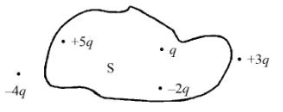Five charges $+q,+5 q,-2 q,+3 q$ and $-4 q$ are situated as shown in the figure.
The electric flux due to this configuration through the surface $S$ is

Five charges $+q,+5 q,-2 q,+3 q$ and $-4 q$ are situated as shown in the figure.
The electric flux due to this configuration through the surface $S$ is

- [JEE MAIN 2024]
- A
$\frac{5 q}{\epsilon_0}$
- B
$\frac{4 q}{\epsilon_0}$
- C
$\frac{3 q}{\epsilon_0}$
- D
$\frac{q}{\epsilon_0}$
Similar Questions
$q_1, q_2, q_3$ and $q_4$ are point charges located at point as shown in the figure and $S$ is a spherical Gaussian surface of radius $R$. Which of the following is true according to the Gauss's law
$q_1, q_2, q_3$ and $q_4$ are point charges located at point as shown in the figure and $S$ is a spherical Gaussian surface of radius $R$. Which of the following is true according to the Gauss's law
Gauss's law can help in easy calculation of electric field due to
Gauss's law can help in easy calculation of electric field due to
$Assertion\,(A):$ A charge $q$ is placed on a height $h / 4$ above the centre of a square of side b. The flux associated with the square is independent of side length.
$Reason\,(R):$ Gauss's law is independent of size of the Gaussian surface.
$Assertion\,(A):$ A charge $q$ is placed on a height $h / 4$ above the centre of a square of side b. The flux associated with the square is independent of side length.
$Reason\,(R):$ Gauss's law is independent of size of the Gaussian surface.
- [AIIMS 2015]
A uniformly charged conducting sphere of $2.4\; m$ diameter has a surface charge density of $80.0\; \mu \,C/m^2$.
$(a)$ Find the charge on the sphere.
$(b)$ What is the total electric flux leaving the surface of the sphere?
A uniformly charged conducting sphere of $2.4\; m$ diameter has a surface charge density of $80.0\; \mu \,C/m^2$.
$(a)$ Find the charge on the sphere.
$(b)$ What is the total electric flux leaving the surface of the sphere?
Assertion : Four point charges $q_1,$ $q_2$, $q_3$ and $q_4$ are as shown in figure. The flux over the shown Gaussian surface depends only on charges $q_1$ and $q_2$.
Reason : Electric field at all points on Gaussian surface depends only on charges $q_1$ and $q_2$ .
Assertion : Four point charges $q_1,$ $q_2$, $q_3$ and $q_4$ are as shown in figure. The flux over the shown Gaussian surface depends only on charges $q_1$ and $q_2$.
Reason : Electric field at all points on Gaussian surface depends only on charges $q_1$ and $q_2$ .
- [AIIMS 2012]
